
Primula is a genus of herbaceous flowering plants in the family Primulaceae. They include the primrose, a familiar wildflower of banks and verges. Other common species are P. auricula (auricula), P. veris (cowslip), and P. elatior (oxlip). These species and many others are valued for their ornamental flowers. They have been extensively cultivated and hybridised. Primula are native to the temperate Northern Hemisphere, south into tropical mountains in Ethiopia, Indonesia, and New Guinea, and in temperate southern South America. Almost half of the known species are from the Himalayas.

Primula bulleyana is a species of flowering plant in the family Primulaceae, native to hillsides in China.

Primula vulgaris, the common primrose, is a species of flowering plant in the family Primulaceae, native to western and southern Europe, northwest Africa, and parts of southwest Asia. The common name is primrose, or occasionally common primrose or English primrose to distinguish it from other Primula species also called primroses. None of these are closely related to the evening primroses.

Primula meadia, known by the common names shooting star, eastern shooting star, American cowslip, roosterheads, and prairie pointers is a species of flowering plant in the primrose family Primulaceae. It is native to the eastern United States and Canada, spanning north from Manitoba and New York, south to Texas and Florida.

George Forrest was a Scottish botanist, who became one of the first western explorers of China's then remote southwestern province of Yunnan, generally regarded as the most biodiverse province in the country.

Primula sieboldii, the Japanese primrose, is a species of primrose that is endemic to East Asia. The species goes by common names such as Siebold's primrose, cherry blossom primrose, Japanese woodland primroseSnowflake, Geisha girl, Madam butterfly and the Japanese primrose which also applies to the related species Primula japonica.

Rhododendron alutaceum is a species of flowering plant in the family Ericaceae. It is native to Tibet and southwestern China, where it grows at altitudes of 3,200–4,300 m (10,500–14,100 ft). This evergreen shrub that grows to 1.5–4 m (4.9–13.1 ft) in height, with thick, leathery leaves that are oblong and broadly lanceolate to lanceolate or narrowly oblong, 5–14 by 1.5–3.5 cm in size. The flowers are white to pink, with crimson spots and purplish-red basal blotch.

Rhododendron argyrophyllum (银叶杜鹃) is a species of flowering plant in the heath family Ericaceae. It is native to forested slopes at 1,600–2,300 m (5,200–7,500 ft) in E and NW Guizhou, S and W Sichuan, and NE Yunnan in China.

Rhododendron decorum, the great white rhododendron is a species of flowering plant in the heath family Ericaceae. It is an evergreen shrub native to high forested regions of northern Myanmar and Guizhou, Sichuan, Xizang, and Yunnan, China growing at altitudes of 1,800–4,000 m (5,900–13,100 ft). Depending on the growing environment it can be found as a shrub or small tree of 1–6 m (3.3–19.7 ft), with leathery leaves that are oblong, oblong-ovate or oblong-elliptic in shape and between 5–19 cm in length and 3–11 cm in width. Flowers are borne in trusses, white to pale pink, with a yellow throat, large and very fragrant.
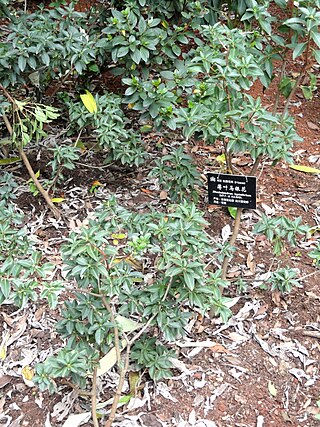
Rhododendron leptothrium (薄叶马银花) is a species of flowering plant in the family Ericaceae. It is native to Myanmar and southwestern Sichuan, southeastern Xizang, and western Yunnan, China, where it grows at altitudes of 1,700–3,200 m (5,600–10,500 ft). This evergreen shrub or small tree grows to 3–4 m (9.8–13.1 ft) in height, with leaves that are lanceolate or oblong-lanceolate, 4–12 by 1.8–3.5 cm in size. The flowers are pale rose to magenta-purple.
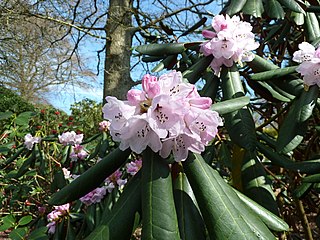
Rhododendron fulvum is a species of flowering plant in the heath family Ericaceae, native to northern Myanmar and China. In China, it is found in southwest Sichuan, southeast Xizang, and western Yunnan. It grows at altitudes of 2,700–4,400 m (8,900–14,400 ft). It is an evergreen shrub or small tree growing to 2–8 m (6.6–26.2 ft) in height, with leathery leaves that are oblanceolate to oblong-lanceolate or obovate, 8–20 by 3–7.5 cm in size. The undersides are felted with a striking cinnamon colour. The flowers, borne in trusses in spring, are loosely bell-shaped, pale rose pink, with a crimson basal blotch and sometimes red spots.

Rhododendron selense (多变杜鹃) is a rhododendron species native to southwestern Sichuan, eastern Xizang, and western Yunnan in China, where it grows at altitudes of 2,700–4,000 m (8,900–13,100 ft). It is an evergreen shrub that grows to 1–2 m (3.3–6.6 ft) in height, with leaves that are oblong-elliptic or obovate to elliptic, 4–8 by 2–4 cm in size. The flowers are pink.
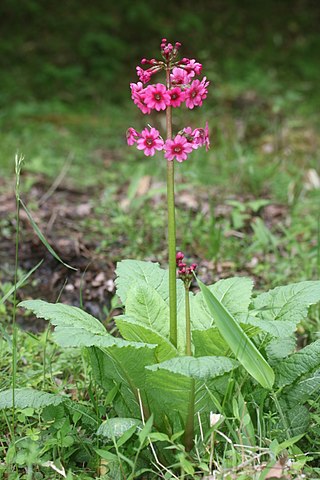
Primula japonica, the Japanese primrose, Japanese cowslip, Queen of primroses, or valley red, is a species of flowering plant in the family Primulaceae, native to Japan. The common name Japanese primrose also applies to the related species Primula sieboldii.
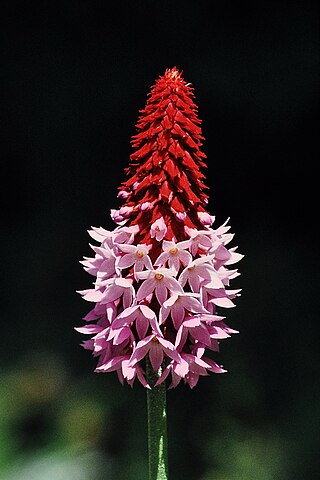
Primula vialii, Vial's primrose, is a species of flowering plant in the family Primulaceae, originating from wet meadows, or near water in high valleys of SW Sichuan and northern Yunnan in southern China.
Roland Edgar Cooper FRSE FRSGS was a British botanist and Curator of the Royal Botanic Garden Edinburgh from 1936 to 1950. Within the Gardens the Roland Edgar Cooper Collection stems from his own work. A number of species found by him bear the name Cooperi. A large number of Rhododendrons collected by Cooper continue to grow in the Gardens.

Osmanthus yunnanensis is a species of flowering plant in the olive family Oleaceae, native to Yunnan and Sichuan in the far south west of China. Growing to 12 m (39 ft) tall and broad, it is an evergreen shrub or small tree with leathery oval leaves, which may be flat or undulate. In winter and spring, small clusters of white flowers in the leaf axils produce an intense fragrance.
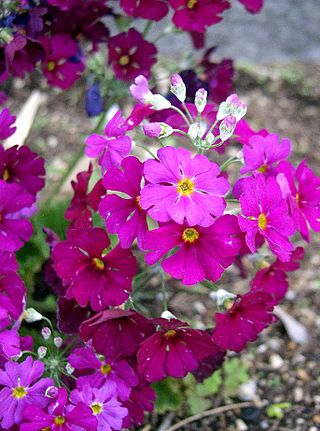
Primula malacoides, called the fairy primrose or baby primrose, is a perennial species of Primula native to the Himalayas, Assam in India, Myanmar, and south-central and south east China. It has gained the Royal Horticultural Society's Award of Garden Merit.

Primula capitata, commonly known as the round-headed Himalayan primrose or Asiatic primrose is a species of flowering plant in the family Primulaceae. It is a short-lived perennial, forming semi-evergreen rosettes of 15cm pale green, mealy leaves that are finely toothed, oblong-lance-shaped or inversely lance-shaped, with white-mealy undersides. Its flowers are up to 1cm long, dark purple and tubular, with shallowly lobed petals; they are borne in racemes that form flattened spheres, held on white-mealy stems about 40cm high.
Primula minor is a species of flowering plant within the family Primulaceae. It was first described by Isaac Bayley Balfour and Frank Kingdon-Ward in 1915. It is a close relative of the species Primula graminifolia.
















